Gini’s method for Decentralized Decision Making
I really like the framing, and nomenclature.
Each individual considers:
reversibility (a decision can be easily reversed)
consequence (a decision has small consequences)
Easily reversible, or have little consequence people should just be able to do.
There’s a spectrum in there that a matrix might better visualize.
Irreversible, but little consequence is good for learning.
Reversible, but with larger consequence is good for experimenting.
- allows to you to debate on facts rather then opinions.
Ginis Decision Making Distribution Goals
When there is no mandate for someone to make a decision, they default to consent
Consensus - do you agree?
Consent - do you object?
Consent boils down to
- preference
- range of tolerance.
And will allow for people with differing preferences to continue to be productive.
Objections are not vetos, they are identified risks that could make the proposal more sound if addressed.
Consent Process:
Present Proposal & Clarifying Questions Round
Quick Reactions Round
Consent & Integrate Objections Round
Sociocracy’s slogan - “good enough for now, safe enough to try”
The Advice Process
The advise process will be useful for including community members or for decisions that effect larger groups at different scopes of impact.
Advise is simply advise.
The essence is any person can make any decision only after seeking advice from
- everyone who will be meaningfully affected.
- people with expertise in the matter.
This DOES NOT mean to try and please everyone or create some watered down compromise.
The Keys.
Nobody can tell the decision maker what to decide.
The decision can not be made until the advice is solicited and understood.
The process must be as transparent as possible.
Decision makers must actively check bias’ (selection bias, confirmation bias, etc.)
Who is the decision maker?
- Someone who already is accountable to the objective key results that directly relate.
- The person who is proposing the decision. It depends on the scope of impact.
NOTE: Pocket may be able to experiment with the latter more.
Natural hierarchies emerge in a network through reputation and merit.
Expertise should be able to influence a decision but should not be the sole criteria for making one.
The spirit is co-creativity
- not authoritative judgement
- not negotiation or compromise
People respect decisions when they feel heard and understood.
We can do forum posts or in-comment tags with
“Advise Process - This is what I need to decide”
Sources that inform decision making.
- Rationality: Many think that rationality rules, and is the legitimate basis for decision-making. Teal considers rational, analytical approaches to be critical, but not the only source to inform decision making.
- Emotions: Whereas the modern-scientific perspective is wary of emotions, Teal recognizes that wisdom is to be found there when we learn to inquire into their significance: "Why am I angry, fearful, ambitious, or excited? What does this reveal about me or about the situation that is unfolding?"
- Intuition: Wisdom can be found in intuition, too. Intuition honors the ambiguous, paradoxical, non-linear nature of reality. We unconsciously connect patterns in ways that our rational mind cannot. Many great minds, like Einstein, had a deep reverence for intuition. They claim it is a muscle that can be trained. Learning to pay attention to intuitions, to question them for guidance, allows intuitive answers to surface.
- Paradoxical thinking: A Teal breakthrough is the ability to live with paradox; beyond “either-or” to “both-and” thinking. Breathing in and breathing out illustrates the difference. Either-or thinking sees them as opposites. Both-and thinking sees them as needing each other. The more we can breathe in, the more we can breathe out. One such paradox is the advice process: it is a decision-making process that at once encourages individual initiative and the voice of the collective. It’s both-and.
Should make an effort to tranform the reflex of permission seeking.
Train and Design environments to solve “What would you need to make this decision yourself?”
Speed of Decision Making is important but also runs the risk of sabotaging the process.
There is a way to dance this dance if you are committed to become that type of person/organization.
Research More Later and add here or new thread.
How to successfully grow distributed leadership
Role Modeling principles
Reinvention Organizations Wiki
Gini Full Handbook
How to practice Non-Violent Communications
Tweet thread on Self-Deception

